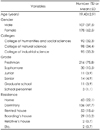Abstract
Objectives
The interpersonal support evaluation list-12 (ISEL-12) is one of the scales used for measurement of perceived social support. This study standardized self-report social support measure, ISEL-12.
Methods
Participants included 294 students of a university. Convergent validity was assessed by correlating scores on the ISEL-12 with those on other scales. A exploratory factor analysis was performed to determine the factor structure of the ISEL-12.
Results
ISEL-12 showed acceptable reliability and validity. High level of internal consistency and reliability (Cronbach α=0.866) and item homogeneity was confirmed. We found two-factor structures of ISEL-12 via factor analysis. The Korean version of ISEL-12 showed significant correlation with other scales for evaluation of perceived social support. Test-Retest reliability was also confirmed (Pearson's correlation coefficient=0.65).
Figures and Tables
References
1. Statistics Korea. Population and Housing Census. 2011. Daejon: Statistics Korea.
2. Procidano ME, Heller K. Measures of perceived social support from friends and from family: three validation studies. Am J Community Psychol. 1983. 11:1–24.

3. Cohen S, Hoberman H. Positive events and social supports as buffers of life change stress. J Appl Soc Psychol. 1983. 13:99–125.
4. Cassel J. The contribution of the social environment to host resistance: the Fourth Wade Hampton Frost Lecture. Am J Epidemiol. 1976. 104:107–123.
5. Brown GW, Bhrolchain MN, Harris T. Social class and psychiatric disturbance among women in an urban population. Sociology. 1975. 9:225–254.

6. Brummett BH, Babyak MA, Barefoot JC, Bosworth HB, Clapp-Channing NE, Siegler IC, et al. Social support and hostility as predictors of depressive symptoms in cardiac patients one month after hospitalization: a prospective study. Psychosom Med. 1998. 60:707–713.

7. Cohen S, Mckay G. Social support, stress, and the buffering hypothesis: a theoretical analysis. Handbook of Psychology and Health. 1984. 4:253–267.

8. Buchanan J. Social support and schizophrenia: a review of the literature. Arch Psychiatr Nurs. 1995. 9:68–76.

9. Broadhead WE, Gehlbach SH, de Gruy FV, Kaplan BH. The Duke-UNC Functional Social Support Questionnaire. Measurement of social support in family medicine patients. Med Care. 1988. 26:709–723.
10. Blazer DG. Social support and mortality in an elderly community population. Am J Epidemiol. 1982. 115:684–694.
11. Suh SY, Im YS, Lee SH, Park MS, Yoo T. A study for the development of Korean version of the Duke-UNC functional social support questionnaire. J Korean Acad Fam Med. 1997. 18:250–260.
12. Kim SY, Shim JY, Won WJ, Sun WS, Park HK, Lee JK. The development of Korean Health Related Quality of Life Scale (KQUOLS): testing reliability and validity. J Korean Acad Fam Med. 2000. 21:382–394.
13. Lee KW, Kim SY, Chung W, Hwang GS, Hwang YW, Hwang IH. The validity and reliability of Korean version of Lubben Social Network Scale. Korean J Fam Med. 2009. 30:352–358.

14. Dr. Cohen's Scales. March 26, 2012. Available from http://www.psy.cmu.edu/~scohen/scales.html.
15. Park JK. Life Satisfaction of People with Disabilities. 2009. Seoul: Sungkyunkwan University.
16. Spitzer W. Patient Health Questionnaire-PHQ-9. PRIME-MD TODAY. 1999. New York: Pfizer Inc.
17. Kroenke K, Spitzer RL, Williams JB. The PHQ-9: validity of a brief depression severity measure. J Gen Intern Med. 2001. 16:606–613.
18. Park SJ, Choi HR, Choi JH, Kim K, Hong JP. Reliability and validity of the Korean version of the Patient Health Questionnaire-9 (PHQ-9). Anxiety Mood. 2010. 6:119–124.
19. Cohen S, Wills TA. Stress, social support, and the buffering hypothesis. Psychol Bull. 1985. 98:310–357.

20. Peters-Golden H. Breast cancer: varied perceptions of social support in the illness experience. Soc Sci Med. 1982. 16:483–491.

21. Lin N, Simeone RS, Ensel WM, Kuo W. Social support, stressful life events, and illness: a model and an empirical test. J Health Soc Behav. 1979. 20:108–119.

22. Orth-Gomér K, Undén AL. The measurement of social support in population surveys. Soc Sci Med. 1987. 24:83–94.

23. Moon SW, Han JC. The effects of cognitive appraisal and perceived social support on adolescents' coping behavior. J Child Adolesc Psychiatry. 1996. 7:233–246.




 PDF
PDF ePub
ePub Citation
Citation Print
Print






 XML Download
XML Download